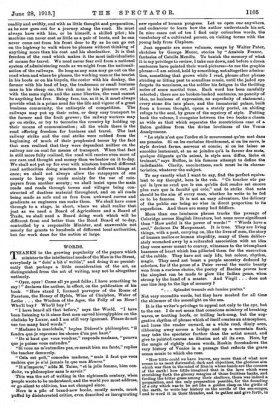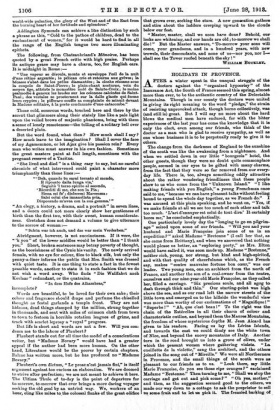WORDS.
THANKS to the growing popularity of the papers which minister to the intellectual needs of the Man in the Street, everybody is " doin' a bit o' writin'," and doing it so persist- ently that perhaps a little consideration of the art, as distinguished from the act of writing, may not be altogether untimely.
" Oyez, oyez ! Come all ye good folks ; I have something to say ! " declares the author, in effect, on the publication of his book. " Here stand I, licensed purveyor of the Roses of Paestum, the Honey of Hybla, Wine of Chalybon, Water of Lethe . . . the Wisdom of the Ages, the Folly of an Hour! Who'll buy ? Who'll buy ? "
"I have beard all that before," says the World. "I have been listening to it since first men carved hieroglyphics on the obelisks by Luxor, and I am still very ignorant. Please do not use too many hard words."
"Madame la markhale," begins Diderot's philosopher, "ii faudra que je reprenne les choses d'un peu haut."
"De si haut que vous voudrez," responds madame, "pourvu que je puisse vous entendre."
"Si vous ne m'entendiez pas, ce serait bien ma faute," replies the teacher demurely.
" Cela est poli," concedes madame, " 'Dais it faut que vous sachiez que je n'ai jamais lu que mes Heures."
"11 n'importe," adds M. Taine, "et la jolie femme, Bien con- duite, va philosopher sans le savoir."
This was the art of writing in the eighteenth century, when people wrote to be understood; and the world you must address, or go silent to oblivion, has not changed since.
Here is a pile of brand-new books, mostly novels, much puffed by disinterested critics, even described as inaugurating new epochs of human progress. Let us open one anywhere, and endeavour to learn how the author understands his art. In nine cases out of ten I find only colourless words, the
vocabulary of a cultivated person, on visiting terms with the young lady from Clapham.
Just opposite are some volumes, essays by Walter Pater, sketches by George Moore, stories by " Anatole France, fantasies of Catulle Mendes. To banish the memory of what it is my privilege to review, I take one down, and before a dozen sentences have painted their word-pictures—to use the graphic phrase—I am seized, held by something, not altogether admira- tion, something that grows while I read, phrase after phrase striding or lilting past to soundless music, until the jaded eye forgets its weariness, as the soldier his fatigue in the thrilling notes of some martial tune. Each word has been carefully selected ; there are no broken-backed sentences, no paucity of idea, no haziness of expression, no superfluity of statement ; every stone fits into place, and the immaterial palace, built from a human thought, opens a stately portal, an abiding
refuge to the soul, by grace of the mystery of style. Putting hack the volume, I recognize between the two books a chasm as wide as that which separates the meretricious ease of a
Salon goddess from the divine loveliness of the Venus Anadyomene.
" Le style n'est que l'ordre et le mouvement qu'on met dans ses pensees. Si on les enchaine etroitement, si on les serve, is
style devient ferme, nerveux et concis; si on les laisse ea succeder lentement, et ne se joindre la faveur des mots, quelque elegants qu'ils soient, le style sera diffus, 'fiche et trainant," says Buffon, in his famous attempt to define the indefinable. Clarity, succinctness, such must be its charac- teristics, whatever the subject.
To say exactly what I want to say, find the perfect equiva- lent to my thought, here is the rub. " Ce toucher stir par qui la lyre ne rend que le son qu'elle doit rendre est encore plus rare que la faculte qui cree," and to strike that note
should be the aim of every man, whether he write to be fed or to be famous. It is not an easy adventure, the delicacy of the public ear being no wise in direct proportion to its superficies. And there are many bad fiddlers.
More than one luminous phrase tracks the passage of
Coleridge across English literature, but none more significant than "How awful is the power of words ! " "Words have a soul," declares De Maupassant. It is true. They are living things, with a past, carrying on, like the lives of men, the story
of human malice or human stupidity, many of them deliber- ately wrenched awry by a reiterated association with an idea
they were never meant to convey, witnesses to the triumphant
baseness of heart which has pilloried them for the execration of the rabble. They have not only life, but colour, rhythm, magic. They need not boast a purple ancestry deduced by scholars, for if the prose of a Pater reveal the exotic beauty won from a curious choice, the poetry of Racine proves how the simplest can be made to glow like Indian gems, when strung by the hand of a master. And Virgil . . . does not one line leap to the lips of memory ?
". . . Splendet tremulo sub lumine pontus."
Not very recondite words, but they have meshed for all time the shimmer of the moonlight on the sea.
It is the writer's privilege to appeal not only to the eye, but to the ear. I do not mean that conscious mimicry of breaking waves, or trotting hoofs, or trilling lark-song, but the sug- gestive rhythm of phrase which of itself creates an atmosphere,
and lures the reader onward, as a white road, dimly seen, ribboning away across a bridge and up a mountain flank, may take the spectator further than the artist meant, and give to painted canvas an illusion not all its own. Here, by the magic of rightly chosen words, Ruskin foreshadows the very history of Venice in a passage that reflects the grave ocean music to which she rose.
"How little could we have known, any more than of what now seems to us most distressful, dark and objectless, the glorious aim which was then in the mind of Him in whose hands are the corners of the earth! how little imagined that in the laws which wero stretching forth the gloomy margins of those fruitless banks, and feeding the bitter grass among their shallows, there was indeed a preparation, and the only preparation possible, for the founding of a city which was to be set like a golden clasp on the girdle of the earth, to write her history on the scrolls of the sea-surges, and to word it in their thunder, and to gather and give forth, in
world-wide pulsation, the glory of the West and of the East from the burning heart of her fortitude and splendour."
Addington Symonds can achieve a like distinction by such
a phrase as this, "Cold to the pathos of children, dead to the enchantment of women," for it would be hard to find in all
the range of the English tongue two more illuminating epithets.
The following, from Chateaubriand's lifocmoires, has been quoted by a great French critic with high praise. Perhaps
its antique grace may have a charm, too, for English ears. It is midnight in Rome :—
"Une vapour se deroule, monte et enveloppe l'ceil de la unit d'une refine argentee; le pelican crie et retourne aux greves; In beeasse s'abat dans les preles diamantees ; in cloche resoime sous la coupole do Saint-Pierre ; le plain-chant nocturne, voix du moyen fige, attriste le rnonastere isol6 do Sainte-Croix; le moine psalmodie a genoux lee laudes sur lee colonnes calcinees de Saint- Paul ; des vestales se prosternent sur In dalle glade qui ferme leers cryptes ; le pifferaro souffle sa complainte do minnit devant In Madone solitaire, a la porte condainnee d'une catacombs."
Those cold, sonorous words, touched here and there by the accent that glimmers along their stately line like a pale light upon the veiled brows of majestic phantoms, bring with them a sense of lonely remoteness—the tolling of a solitary bell over a deserted plain.
But the word found, what then ? How much shall I say ?
How much leave to the imagination? Shall I cover the face of my Agamemnon, or let Ajax give his passion rein? Every man who writes must answer in his own fashion. Sometimes the great masters paint at full length, sometimes with the pregnant reserve of a Tacitus.
" She lived and died " is a thing easy to say, but no careful
chronicle of what intervened could paint a character more triumphantly than those lines :— " 'Deb, quando to sarai tornato al mondo, E riposato dalla lunge via,' Seguite, '1 terzo spirit() al secondo,
'Ricorditi di me, the son In Pia,; Siena mi fe' ; disfecemi Maremma: Salsi colui she innanollata pria,
Disposando m'avea con in sus gemma.'"
"An elegy, a history, a drama, and a portrait" in seven lines, and a dozen could not more clearly show her gentleness of birth than the first two, with their sweet, human considerate- ness. Gretchen does not demand a volume to give utterance to the sorrow of woman:— " Schou war ich such, and das war mein Verderben."
Abridgment, however, is not succinctness. If it were, the "'k you" of the lower middles would be better than "I thank you." Short, broken sentences may betray poverty of thought, as the boorishness of the Cynic his vanity. The newly arrived female, with no eye for colour, flies to black silk, but only the penny-a-liner informs the public that Mrs. Smith was dressed with quiet taste. It is one thing to state a fact in the fewest possIble words, another to state it in such fashion that we do not wish a word away. Who finds " Die Wallfahrt nach Kevlaar " redundant, or the quatrains, "In dem }rote des Alhambras,"
incomplete ?
Words are beautiful, to be loved for their own sake ; their colour and fragrance should drape and perfume the chiselled thought as festal garlands a temple front. They are not hideous, dead things stamped by the million, strung together in thousands, and sent with miles of crimson cloth from town
to town to festoon in horrible rotation leagues of grime, and track with scarlet leprosy a "royal" progress.
But life is short and words are not a few. Will you con- demn me to the labour of Flaubert ?
Flaubert stands out for all time the model of a conscientious writer, but "Madame Bovary" would have had a greater appeal if the author had been more human. On the other Land, Literature would be the poorer by certain chapters.
Ealzac has written more, but he has produced no "Madame Bovary."
Flaubert's own dictum, " Le prose n'est jamais fini," is itself argument against too curious an elaboration. We are doomed to strive after perfection; we are not meant to achieve it here. The Ultima, Thule of to-day is the point of departure for to-morrow, to-morrow that ever brings a more daring voyager seeking the old goal by an untried way. We, workers of an hour, cling like mites to the colossal flanks of the great edifice
that grows ever, seeking the stars. A new generation gathers and stirs about the ladders creeping upward to the clouds below our feet.
"Master, master, shall we soon have done? Behold, our locks are whitening, and our hands are old ; to-morrow we shall die !" But the Master answers, " To-morrow your sons will come, your grandsons, and in a hundred years, with new trowels, their descendants, and none of us—nor you, nor shall see the Tower roofed beneath the sky !"
WILLIAM BUCKLEY.



























































 Previous page
Previous page